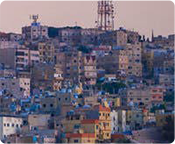
Amman is the capital of the Hashemite Kingdom of Jordan and the center of the Capital Governorate. It is the largest city in the kingdom and one of the largest Arab cities in terms of population. In 2014, its population reached approximately 4 million people, making it also one of the fastest-growing cities in the world in terms of population. The city is located in the center of the kingdom, at a latitude of 31 degrees north and a longitude of 35 degrees east, in a mountainous region. It originated in the valleys between the mountains, but as it became crowded, its inhabitants climbed its slopes and continued to expand across its peaks until the city spread across more than 20 mountains.
Amman is considered the commercial and administrative center of Jordan and its economic and educational heart. Due to its strategic location and modern architecture, Amman attracts many Arab communities. It also attracts tourists annually from Western Europe, North America, Japan, Australia, as well as neighboring and nearby Arab countries, especially families from the Gulf region, due to its numerous tourist attractions and medical facilities. Its strategic location in the Levant and the Middle East has made its economy a driving force, controlling 90% of national investment.
The history of Amman dates back to the 7th millennium BCE, making it one of the oldest inhabited cities in the world to this day. Amman is an ancient city built on the ruins of a city known as "Rabbath Ammon," then "Philadelphia," and finally "Amman," derived from "Rabbath Ammon," which the Ammonites made their capital. The city was built on seven hills and was apparently a regional center at that time. It was one of the four capitals of Bilad al-Sham and became the capital of the Emirate of Transjordan and then the Hashemite Kingdom of Jordan after its independence in 1946 from Britain.
Modern Amman is inhabited by a diverse population with different origins, including people from nearby Jordanian cities, as well as Palestinians, Caucasians, Syrians, and Iraqis.
Recently, the Greater Amman Municipality has witnessed significant development, with Amman expanding like never before. The comprehensive plan of the city of Amman has won international awards, including the Global Leadership Award in City Planning and the City Award for Asia in 2007. There are 22 administrative districts in the Greater Amman Municipality, each containing a fully staffed team. Administratively, there is the Greater Amman Municipality Council, which consists of 68 members, chaired by the Mayor of the Capital. The council is further divided into 14 different committees.
It's worth mentioning that March 2nd of each year has been designated as Amman Day after a decision by the Jordanian Cabinet at the beginning of 2021, as part of celebrating 100 years since the establishment of the Jordanian state.

